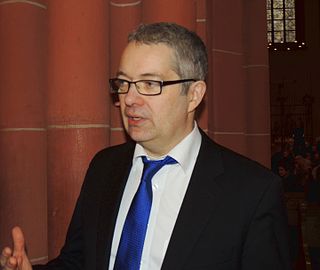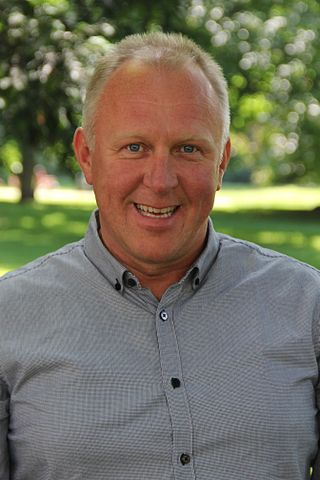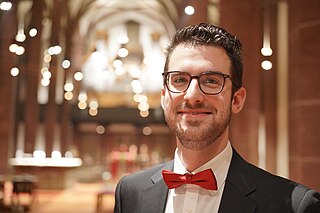"Segne dieses Kind" is a poem in six stanzas by Lothar Zenetti. With different melodies, it became a Christian hymn of the genre Neues Geistliches Lied (NGL), appearing in current German hymnals, usually sung for baptism. The full title is "Segne dieses Kind und hilf uns, ihm zu helfen", which is the beginning of all six stanzas.

Peter Reulein is a German composer, organ improviser, academic teacher and church musician, from 2000 at the church Liebfrauen in Frankfurt am Main. In 2016 he composed for the Catholic Diocese of Limburg the Franciscan oratorio Laudato si'.

Helmut Alfons Schlegel is a German Franciscan, Catholic priest, meditation instructor, author, librettist and songwriter. He is known for writing new spiritual songs, set to music by various composers.

Neues Geistliches Lied, abbreviated NGL, is a music genre of songs in German intended for church usage, and based on contemporary lyrics and with music by contemporary composers.

Patrick Dehm is a German Catholic theologian, supervisor and clinical Gestalt therapist. He and his brother founded the Eugen Dehm foundation, supporting a holistic health concept, in memory of their father.
Joachim Raabe is a German church musician and a composer of sacred music, especially of the genre Neues Geistliches Lied.
inTAKT is a German ecumenical association (Verein) for the promotion of new Christian songs for church services, and of art, culture and musical education. Its members are mostly hymnwriters and composers interested in NGL.
"Herr, segne uns" is a poem in three stanzas by Lothar Zenetti, written in 1971. With a 1972 melody by Karl Fink, it became a Christian hymn of the genre Neues Geistliches Lied (NGL), appearing in German hymnals. It is usually sung at the end of a service before the blessing. The full title is "Herr, segne uns, lass uns dir dankbar sein".

"Glauben können wie du" is a Christian poem by Helmut Schlegel, written in 2009, and made a hymn of the genre Neues Geistliches Lied with a melody by Joachim Raabe the same year. It addresses Mary, the mother of Jesus, to be imitated living the theological virtues of faith, hope and love. The song is included in song books and the Catholic hymnal Gotteslob.
"Sag ja zu mir, wenn alles nein sagt" is Christian hymn, with lyrics written by Diethard Zils in 1971, and music by made a hymn of the genre Neues Geistliches Lied with a melody by Ignace de Sutter. It is a penitential song, which appeared in the Catholic hymnal Gotteslob of 1975. In the 2013 version, it appears only in regional sections.

"Gott, der du warst und bist und bleibst" is a Christian hymn with text by Eugen Eckert and a melody by Herbert Heine. It is also known by the title of its refrain, "Wir haben hier keine bleibende Stadt". The song was written in 1993, in the genre Neues Geistliches Lied (NGL). It appears in several regional sections of the German Catholic hymnal Gotteslob, and in other songbooks.

"Meine engen Grenzen" is a Christian poem by Eugen Eckert, written in 1981, and made a hymn of the genre Neues Geistliches Lied with a melody and setting by Winfried Heurich the same year. The song, bringing one's shortcomings and limitations before God and praying for a broader perspective, is part of the common German Protestant and Catholic hymnals, and of other songbooks.

Johannes M. Schröder is a German organist, composer and Catholic church musician. After several years responsible for the church music at the Westerwälder Dom, he moved to St. Bonifatius, Wiesbaden. He is also a lecturer and a music editor.
Habakuk is a German pop band from Frankfurt, formed in 1975. The group is focused on new Christian music of the genre Neues Geistliches Lied.

"Nahe wollt der Herr uns sein" is a Christian hymn with German text, translated in 1971 from a 1964 Dutch hymn by Huub Oosterhuis. Its refrain says that God is among people but not recognised. The song, of the genre Neues Geistliches Lied (NGL), appeared from 1975 in German hymnals, then in the common section of the Catholic Gotteslob. In the hymnal's second edition, it appeared only in regional sections.
"Segne, Vater, diese Gaben" is a Christian hymn. The authors of text and melody are unknown. It is meant to be sung as a round. The song, which is often used for a prayer before a meal, has appeared in German hymnals and songbooks. It is regarded as a song of the genre Neues Geistliches Lied (NGL), and has been used in schools and events for young people.
"Auf dem Weg durch diese Nacht" is a Christian hymn created in 2005 by lyricist Eugen Eckert and composer Horst Christill. The song of the genre Neues Geistliches Lied (NGL), was first published and recorded in 2006, and has appeared in German hymnals and songbooks. Auf dem Weg durch diese Nacht became the title of a 2021 choral collection of new compositions for Abendlob.
"Wenn wir das Leben teilen" is a 2001 Christian offertory hymn with text by Hans Florenz, with a melody by Michael Wackenheim. The hymn of the genre Neues Geistliches Lied is contained in several hymnals and songbooks.

"Weite Räume meinen Füßen" is a Christian hymn in German with text by Eugen Eckert and a tune by Alejandro Veciana. It is based on a verse from Psalm 31, "Du stellst meine Füße auf weiten Raum", which forms the refrain. Its topics are the broad perspectives of life. The song of the genre Neues Geistliches Lied is part of many hymnals and songbooks.









